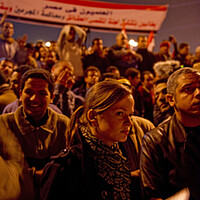Last American NGO worker in Egypt takes flight to avoid prison
Loading...
| Cairo
The lone American who stayed in Egypt to stand trial in a case against civil society workers finally left two days ago, traveling to Rome hours after he was sentenced to two years in prison.
Although his American colleagues at the National Democratic Institute (NDI) fled Egypt last year to avoid the trial, Robert Becker chose to remain in Cairo to face charges alongside his Egyptian staff. On June 4, an Egyptian court sentenced 43 employees of five nongovernmental organizations to between one and five years in prison. Western governments and human rights advocates have called the case politically motivated and branded it an effort to stifle pro-democracy and human rights organizations in Egypt.
Speaking by phone from Rome, Mr. Becker said he made the decision to leave only after he was sure that none of his Egyptian colleagues were going to jail. They were given one-year suspended sentences, meaning they do not have to serve time in prison.
The decision to go, he said, “was one of the toughest decisions I've ever made in my life. I stayed out of loyalty to my staff. I could not fathom leaving them behind to face this alone … it wasn't until I was positive that they were in the clear that I decided that I had taken this as far as it could go.”
Now, he says, “I'm in legal limbo exile.” Becker says he is "tired, exhausted, and angry, and immensely sad."
Becker awaited the verdict in the Cairo cafe where he has become a fixture in the 18 months since his former employer, NDI, was raided by Egyptian security forces, along with more than a dozen other organizations. NDI fired him when he chose to stay in Egypt instead of leaving with the rest of the Americans who worked with NGO and the International Republican Institute, both of which receive funds from the US government. (Editor's Note: Leslie Campbell, NDI's Middle East and North Africa regional director, disputes the notion that Becker was fired in a written response to this article. The organization, he writes, offered to help find Becker alternative employment elsewhere because it no longer did work in Egypt, but Becker insisted on staying.)
He learned via Twitter that he had been convicted and sentenced to two years in prison. But he says the next hour and a half were filled with confusion as his lawyers attempted to determine whether his sentence was suspended or not. When it became clear that, unlike his Egyptian colleagues, he would actually have to serve time in prison, and that a warrant for his arrest could be issued at any moment, he grudgingly heeded his lawyers' advice, headed to the airport with one suitcase, and boarded a flight to Rome.
He says the verdict was political, and he is hopeful that it will be overturned on appeal. “If evidence matters, we're not guilty. Clearly evidence had no relevance whatsoever. This case was political from the start, and political where it ended. And the only people getting hurt here are Egyptians.”
Becker says the critical freedoms of expression, assembly, and association are “under assault” in Egypt, and that it's up to President Mohamed Morsi to stop that assault.
US government officials have not been in contact with him since his conviction, he says, though he has received calls from European members of national parliaments, European Union officials, and human rights activists in Europe.
“I'm frustrated with the US response on this,” he says.
Secretary of State John Kerry said the US is "deeply concerned" about the verdict. "This decision runs contrary to the universal principle of freedom of association and is incompatible with the transition to democracy," he said in a statement.
Becker says, "the US needs to stop being 'deeply concerned' and start getting deeply angry.”






